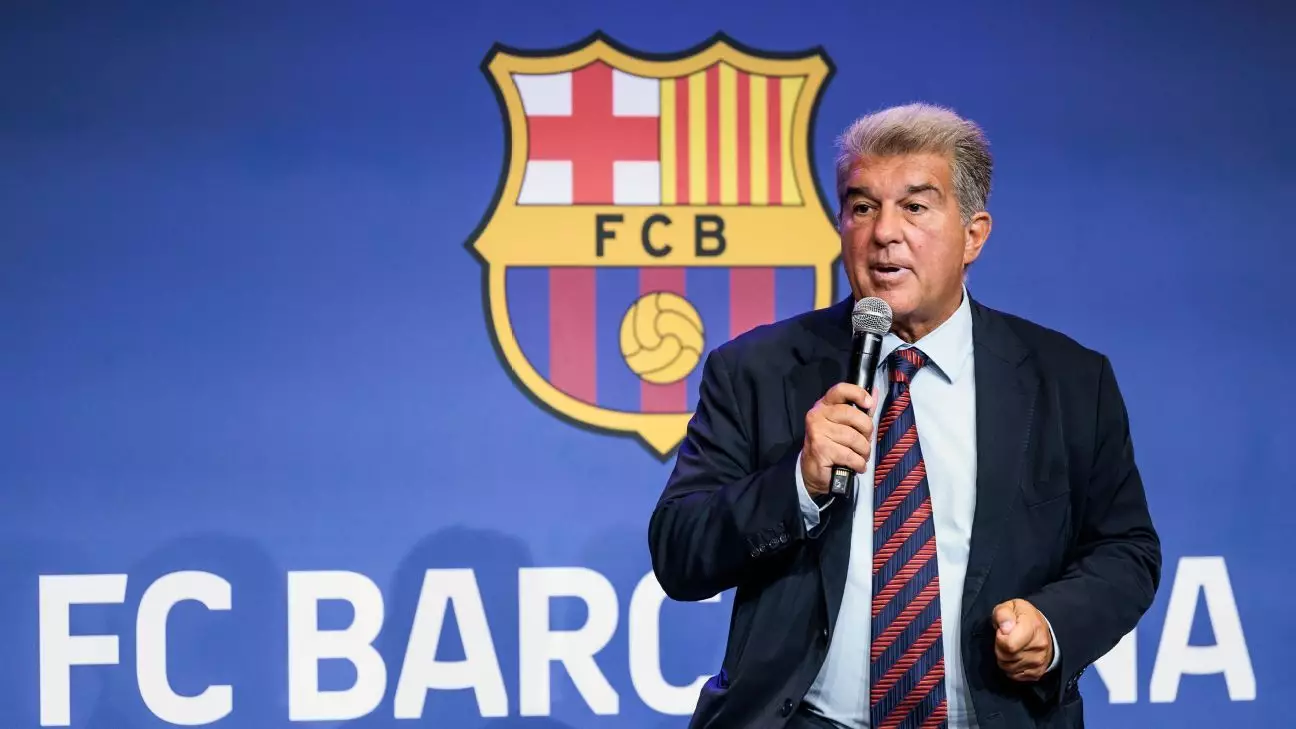In the backdrop of FC Barcelona’s ongoing financial turmoil and intense scrutiny regarding its management, club president Joan Laporta confronted his detractors head-on during the recent annual general meeting. The approval of the club’s 2023-24 accounts, despite recording a staggering net loss of €91 million (approximately $98.9 million), signals a turbulent chapter in the storied history of one of football’s largest clubs. Laporta’s robust defense of his administration serves as both a testament to his leadership and a reflection of the challenges that still lie ahead.
The financial reports presented during the AGM painted a stark picture for the Catalan giants. The loss attributed to the struggles within the club’s “Barça Vision” subsidiary was the focal point of criticisms that Laporta faced. However, a sizable majority of 452 votes from club members supported the current management team, suggesting that confidence in Laporta’s strategy may be gaining traction. The financial decisions made so far, including the controversial sell-off of future television rights and assets, illustrate an aggressive—if not desperate—attempt to stabilize the club’s finances. While these decisions may provide immediate relief, they invoke a critical question regarding sustainability and long-term viability.
Laporta asserted, “We’re putting the finances back on a sound footing in as little time as possible.” Such statements may resonate positively with supporters and stakeholders; however, they do little to disregard the pressing concern of whether Barcelona’s drastic measures risk undermining the club’s heritage and future.
In his address, Laporta underscored how vital it was to restore a balance between financial prudence and competitive integrity. The club’s financial woes have paralleled its declining performance on the pitch, heightening anxiety within the fanbase. While Laporta touted the reduction of the sporting wage bill as an achievement—claiming it brings the ratio of salaries to income in line—this may be a double-edged sword. Relying heavily on homegrown talents while simultaneously cutting back on star purchases risks compromising the quality of the squad. Although investing in young players is a welcome strategy reflective of Barcelona’s identity, the intensity of competition in La Liga demands a more robust approach.
By referencing the club’s past expenditures—the exorbitant wage structures that reached an unsustainable 98%—Laporta set a benchmark for accountability. Yet, one wonders whether sacrificing immediate star power for long-term financial health is a strategic misstep, considering the global football landscape continues to evolve rapidly.
Throughout his speech, Laporta took a pointed stance against critics who have questioned his leadership, particularly in light of the club’s involvement in the controversial payments to former refereeing vice-president José María Enriquez Negreira. Without naming specific individuals or factions, Laporta’s rhetoric hinted at an inherent animosity he feels from outside the club. “We fight against everything and everyone,” he declared, portraying the club as a resilient entity battling against external adversities.
While rallying fans with sentiments of unity and defiance is not uncommon for leaders in crisis, it risks alienating stakeholders who are simply looking for accountability and transparency. The ongoing investigation into these payments hangs ominously over the club and could have ramifications that extend far beyond this fiscal year if not resolved convincingly.
As of now, amidst these trials, Barcelona sits atop the La Liga table under new coach Hansi Flick, a silver lining in an otherwise tumultuous period. The upcoming matches, particularly against Sevilla, will test both the squad’s resilience and the effectiveness of the management’s decisions. The players’ recovery, including emerging talents like Gavi and Fermín López, reflects an encouraging trend toward recovery and readiness.
With this context, Laporta’s presidency is at a critical juncture. Embracing transparency, carefully aligning player investments with financial strategies, and maintaining Barcelona’s competitive ethos will be the true litmus test for the future. The coming months will likely define whether this storied club can rise from its financial ashes or risk crumbling under the weight of its past mistakes.

Leave a Reply